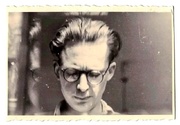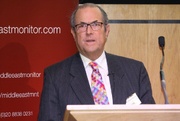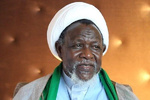Charles Taliaferro says this is partly “because questions about the purpose of the natural sciences is itself a philosophical question, and so is the question about the ultimate nature of the natural sciences.”
Charles Taliaferro, professor of philosophy at St. Olaf College, made the remarks in an interview with the Mehr News Agency.
Following is the text of the interview:
Q: Do you give your books and articles to some scholars before publishing them?
A: Yes! I have never published a book (and my sixteenth book was just published this week; it is called A Brief History of the Soul) without giving it to at least ten or more scholars, and often to some of my students. Each of my book manuscripts has gone through no less than five revisions. Having other readers go through multiple drafts is crucial, because I write books for other people, not for myself. Of course, I will sometimes re-read my own work, but this is largely to see for ways in which I might improve the text for others. A famous American writer once remarked that writing is re-writing. That has very much turned out to be the case for me and it is an outlook I encourage in my students. More specifically, I also recommend re-reading and re-writing in different settings, from your office or library to a coffee house to an airport, and so on. Sometimes just shifting the setting can occasion new insights, especially when you can be guided by comments from others about what worked and did not work.
Just as there is almost nothing better than to have someone thank you for some insight in a book, there is almost nothing worse than to live with what you come to see as grave mistakes in your work. In order to reduce the probability of agonizingly bad, compelling criticism, I recommend that all writers circulate their work as much as time will allow prior to publication. In the end, however, no writer who is ambitious can escape mistakes. It is a humbling experience, but then humility is a virtue, right?
Q: How your specialty affects your personal life?
A: The practice of philosophy has impacted my personal life in three ways. First, as a philosopher working as a college professor it has given me a way to interact with others about some of the deepest questions one can raise --questions about good and evil, God and the soul, and even the meaning of life. This has thus enabled me to be in conversation with many, diverse people on matters that are of enormous personal importance. Second, because philosophy as a discipline ranges over so many areas (almost for any X, there is a philosophy of X, so there is even philosophy of sports and philosophy of food!), I think my discipline has made me personally more open to engage other areas of inquiry. Third, for me, philosophy has been quite international, so it has led me to be in contact with other philosophers on every continent. Right now I am working with another philosopher on a six volume History of Evil that will involve around 80 philosophers from around the world, reflecting on the concept of evil in both social and political and religious history as well as the role "evil" has played in the history of ideas. This, and other projects, has led to personal friendships across many nations and cultures.
Q: Is studying in human and social sciences an advantage for having better relations with our environment?
A: Yes. I believe that one of the biggest obstacles in our environmental ethics is ignorance. Sometimes we may engage in destructive environmental practices out of cruelty and narrow self-interest, but I suggest we often simply fail to fully understand or appreciate how our farming, our treatment of waste, pollution, population growth, and so on, impacts our planet and future generations. A grounding in the human and social sciences may not be a guarantee that our treatment of the environment will improve, but it certainly seems to be of vital importance in developing a mature, respectful environmental ethic.
Q: Humanities does not have some formal advantages over natural sciences in our era. Do you agree?
A: I think the Humanities does have some formal advantages over the natural sciences. In part this is because questions about the purpose of the natural sciences it itself a philosophical question, and so is the question about the ultimate nature of the natural sciences. Why conduct scientific inquiry and into what areas of the natural world?
Is scientific inquiry our best mode of producing reliable beliefs about the world? Does the scientific study of human nature give us reason to believe materialism is true? Does science tend to support or challenge religious conceptions of the cosmos? And so on. These are all philosophical questions and they require a philosophy of science in order to forge answers to them. And philosophy is part of the humanities, if not at the very core of the humanities.
Q: Why have you chosen humanities?
A: Because of the comprehensibility of the humanities. In philosophy, one may and in fact one must comet to terms with understanding and assessing the relationship of all other forms of inquiry: mathematics, the natural and social sciences, history, theology, and so on. In the humanities in general, and philosophy in partciular, one is having to constantly think through and assess the general state of inquiry.
Q: What are your reasons for studying your discipline?
A: Partly my chief reason is the one I have already spoken about: the comprehensibility and even the inescapability of the humanities in a full, mature education or outlook. If one sought to do away with the humanities and only promote the natural sciences, this would paradoxically be because we have all adopted a philosophical outlook.
We would have wound up shutting down philosophical departments and inquiry in the name of a commitment to our own supreme philosophy that only the natural sciences are worthy of pursuit. This would be profoundly unwise and not just paradoxical, as history has established that times of cultural flourishing (and one needs a flourishing culture to sustain the practice of science) involve times when there is education and opportunities for citizens to engage in their own philosophical reflection. This may be seen in the golden age of philosophy in ancient Greece or at the time of Cicero in ancient Rome, in the Renaissance in the Florentine Academy, in Britain in the 17th century with the Cambridge Platonists, early American political debate in the 1780s, and so on.
Q: Do you agree with this point that paper (and not book) is the main format of writing in humanities? Why?
A: In general, the format of the paper has great prominence today because of the prestige and powerful opportunities provided by conferences.
Even at conferences when books are featured --for example at a session in which an author meets critics-- the critics offer their observations in the form of papers and the author replies in the format of a paper. Books do have a huge advantage, however. One of the more common objections to a paper is that the author did not address this or that objection, but we all know that given the limits of a paper it is simply impossible to anticipate all objections. In a book format, an author can take on more objections and develop more sustained, interconnected arguments.
Q: How do you write your papers?
A: I often write them out by hand rather than begin with a computer, as this compels me to write more slowly and more reflectively. Once satisfied with the main body of the text, I will then seek to edit and re-edit a version on line. More generally, I rarely begin writing without having the argument (or central thesis) worked out. I find writing scholarship to be hugely rewarding and feel it is always an honor when anyone reads and responds to one's work.
Q: Are your papers based on your lectures?
A: I rarely lecture, except when invited by a university or institute to do so. I much prefer the dialogue or conversation model of practicing philosophy. In such a format, I think that each participant can help raise the quality of the other's contribution. A good exchange is a good collaboration in which (ideally) all parties can be enriched.
Still, I expect most other professors use their lectures to establish chapters in a projected book, which is one of the reasons why Oxford and Cambridge University scholars often write books with eight chapters. There are eight weeks in a term, and I wager that is why each lecture counts as each chapter.
Q: What were your mainsprings for entering into your discipline?
A: I was drawn to philosophy as a boy for two reasons, one perhaps rather self-interested and the other more noble. I was the youngest of four brothers, and my three older brothers were constantly trying to make me feel rather dim witted. Much of this was quite innocent and not out of the ordinary, but at about 13 years old I discovered that there was a field (philosophy) that specialized in arguments, reasoning and logic. Diving into philosophy gave me some tools to help defend myself from my older brothers! Secondly, I was stunned to learn that the area of philosophy grew out of the love of wisdom (the literal meaning of "philosophy" from "philo" meaning "love" and "sophia" meaning "wisdom" in Greek). The first philosophy book I read was William Durrant's The Story of Philosophy. While not perfect (the middle ages and Islam are completely ignored), Durrant made the history of ideas exciting, and that excitement has not left me.
Have those mainsprings remained yet? I have since become friends with my brothers and so I no longer practice philosophy in self-defense from my family! But I do remain enormously captured by the beauty and energy of the history and current field of philosophy. There is a lively international community of philosophers all working on related themes, and I find such collaboration and engagement to be one of the greatest joys.
Q: What are your main questions in your discipline?
A: What is there (metaphysics)? What can we know (epistemology)? What should we do (ethics)? How shall we govern (political philosophy)? And then lots of questions that are related to all of them such as "Does God exist?" which involves metaphysics and epistemology but comes under the heading of "philosophy of religion." "What is truth?" also involves metaphysics and epistemology but is sometimes considered a part of philosophy of language. Almost all the areas of philosophy historically are alive today. So, the arguments between Plato and Aristotle are still in play among contemporary Platonists and Aristotelians, and then there are Humeans, Kantians, and so on. There is a great pluralism in philosophy today that is refreshing and exciting.
Q: What is your definition of authentic thinking?
A: That is a most excellent question. If there can be "authentic thinking," this suggests that there can be thinking that is inauthentic. Probably in the twentieth century the philosophers who were most keen to expose what they thought was inauthentic thinking were those we now think of as existentialists: Sartre, Camus, and, going back further, Nietzshe and Kierkegaard. Each of these thinkers challenge us to question our confidence that we are honest and fair minded when, in actuality, we may be self-deceived or acting on motives that we fear to admit to others or ourselves. Authentic thinking seems fundamentally to be thinking that is honest and based (as nearly as we can manage) on integrity. Minimally this involves truth-telling and lack of deception (not claiming that an idea is your own when it is really someone else's), but more broadly authentic feelings means trying to think responsibly in terms of the values that have a claim on us, our community, and (more broadly still) the world at large. I am not thinking authentically about my community if I ignore its real needs.
Q: Why do we need to have authentic thinking in our time?
A: Because without honset, even fearlessly honest thinking we will not be able to engage in honest, even fearlessly honest communication. And in our time, when the means and power of communication is greater than ever before, we need to foresweare dishonest, deceptive language and thought. But "authenticity" is needed not just because we need honesty, but we need to responsibly (and thus authentically) respond to the values that surround us.
Q: Thinking (like the other actions) has some codes of conduct. In your opinion what are codes of conduct of thinking?
A: Throughout the history of philosophy, there has been a widespread recognition that good thinking involves a cluster of virtues or, if you like, codes. Some of these virtues are quite formal: good thinking should be as clear as possible, consistent, and cohere with the evidence available. One should recognize formal entailments (if you know If A then B, and you have evidence for A, then you have evidence for B) and avoid logical fallacies (it does not follow that If A then B, and there is evidence for B, then you have evidence for A; you would only have evidence for A if you know: If and only if A, then B). In reasoning that is inductive, we likewise want to exercise caution and not, for example, make hasty generalizations (assume on the basis of seeing two white swans, conclude that all swans are white). But in addition to such formal strictures, there are also more substantial values that may be difficult to formulate precisely Roughly speaking, we expect good thinking to involve fairness to all involved parties, to involve genuine, authentic listening to those who disagree, and so on. Here there seems to be a real overlap with moral virtues: just as we praise courageous action, we expect courageous thinking. Just as we think gluttony (excessive eating is a vice) we think that excessive believing is a vice (e.g. someone believes *anything* they are told, no matter how proposterous).
Q: Are these codes universal, or depending on various cultures and traditions?
A: There is some variation. In some secular cultures, there is a presumption that appealing to revelation, illumination, or a sacred scripture does not count as good thinking, whereas there are religious cultures and traditions in which such appeals can be very good components of clear and compelling thought. Some philosophical systems are suspicious about appealing to reason (empiricists) whereas in other traditions there is some suspicion over sensory experience (rationalism). In my view, in almost all such cases there is a happy medium. For example, in the first case I think that it would not be good thinking to rule out in principle any possibility for veridical (reliable) religious experience, but then again I suggest it would not be good thinking to accept *any* or *all* sacred scriptures or testimonies. Balance and openness but without gullibility seems the most promising.
Charles Taliaferro, professor of philosophy at St. Olaf College, is the author of Consciousness and the Mind of God Contemporary Philosophy of Religion, Evidence and Faith; Philosophy and Religion Since the Seventeenth Century, Dialogues About God, Philosophy of Religion, and The Golden Cord; A Short Book on Eternity. He has given lectures at Oxford, Cambridge, Columbia, the University of Chicago, Princeton, New York University, and elsewhere.
JH/HK
END
MNA
























Your Comment